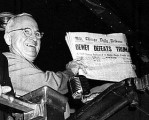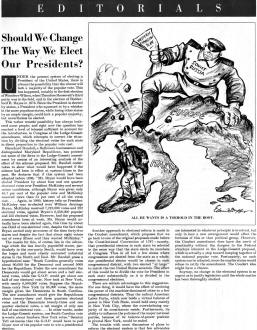Editorial: Should We Change the Way We Elect Our Presidents?
|
|
Concern over the results of the very close 3-way race in the 1948 U.S. presidential election between Truman (D), Dewey (R), and Thurmond (SRDP*) had pundits pontificating and bloviating about the merits of the Constitutionally mandated electoral college system. Sound familiar? That was the election where the Chicago Tribune prematurely published the headline "Dewey Defeats Truman" - Fake News in today's popular lingo. Candidates campaign to accumulate electoral college votes based on Constitutional dictates, not to win the popular vote. If they were focused on winning the popular vote, campaign strategy would be completely different. States where a candidate is certain he/she will win all the electoral votes are typically ignored entirely or have very little campaign time spent in them. Similarly, a candidate who knows there is almost no hope of winning the electoral votes of a certain state will likely not spend valuable time and money campaigning there. Strategy planners (and news reporters) know that going into the race. You win or lose according to the rules of the game. The Constitution can be amended to change those rules if the states demand it; in fact, the 12th Amendment modified the electoral system in time for the 1804 election. Here is a list of elections where the electoral vote winner did not win the popular vote. Just as the U.S. Constitution stipulates that each state gets two senators regardless of population, the electoral college system prevents a relatively small number of highly populous areas from wielding absolute control over the minority areas**. Otherwise, states like North Dakota and Iowa might as well never vote since their wills would be utterly insignificant. Pure Democracy works well for the numerical majority, but not necessarily so well for the minority. As the saying goes, "Democracy is two wolves and a lamb voting on what to have for lunch." * SRDP = States Rights Democratic Party, aka Dixicrats. ** Election maps of 2016 election. The Saturday Evening Post Editorial: Electoral College Or Popular Vote?
This rather remote possibility has always both-ered some people; and right now the question has reached a level of interest sufficient to account for the introduction in Congress of the Lodge-Gossett amendment, which attempts to correct the situation by dividing the electoral votes for each state in direct proportion to the popular vote cast. Blanchard Randall, a Baltimore businessman and distinguished Maryland Republican, has pointed out some of the flaws in the Lodge-Gossett amendment by means of an interesting analysis of the effect of the scheme proposed. Mr. Randall undertakes to show what would have happened if the scheme had been in effect at various times in the past. He declares that if this system had been adopted before 1896, "Mr. Bryan would have been elected President by about four and one quarter electoral votes over President McKinley and several minor candidates, although Bryan was given only 46.7 per cent of the popular vote and McKinley received more than 51 per cent of all the votes cast . . . Again, in 1900, history tells us President McKinley received 7,219,000 votes and 292 electoral votes, against Bryan's 6,358,000 popular and 155 electoral votes. However, had the proposed amendment been at work, Mr. Bryan would actually have been elected again, this time by about one third of one electoral vote, despite the fact that Bryan carried only seventeen of the then forty-five states and despite the fact that about eight voters out of every fifteen said they wanted McKinley." The reason for this, of course, lies in the advantage which the less heavily populated states, particularly in the one-party South, would have over the larger and more closely contested industrial states in the North and East. Mr. Randall posed a hypothetical case: "South Carolina generally votes about 90,000 for Democrat and around 5,000 for the Republican. Under the new amendment the Democrats would get about seven and a half electoral votes, while the G.O.P. would get about one half of one electoral vote. Now look at New York, with nearly 6,500,000 votes. Suppose the Republicans carry New York by 85,000 votes, the same margin given Democrats in South Carolina. The new amendment would give the Republicans about twenty-three and three quarters electoral votes and the Democrats twenty-three and a quarter electoral votes, a net margin of only one half of one electoral vote . . . In other words, under the Lodge-Gossett system, one South Carolina vote is worth about fourteen New York votes." Senator Taft estimates that the G.O.P. would have to poll 53 per cent of the popular vote to win a presidential election. Another approach to electoral reform is made in the Coudert amendment, which proposes that we go back to one of the original proposals made before the Constitutional Convention of 1787 - namely, that presidential electors in each state be selected in the same way that the state elects its members of Congress. Thus in all but a few states where congressmen are elected from the state as a whole, one presidential elector would be chosen in each congressional district, with two elected "at large" to match the two United States senators. The effect of this would be to divide the vote for President in each state substantially as it is divided in the congressional elections. There are certain advantages to this suggestion. For one thing, it would have the effect of confining the power of the machine-dominated cities to a few congressional districts. Thus the radical American Labor Party, which now holds a virtual balance of power in New York State, would hold sway mainly in New York City, where the overwhelming majority of its constituents reside. Furthermore, its ability to influence the policies of the major national parties, because of its balance-of-power position in pivotal New York, would be ended. The trouble with most discussions of plans to reform the electoral system is that few advocates are interested in whatever principle is involved, but only in how a new arrangement would affect the fortunes of this or that political group. However, the Coudert amendment does have the merit of practicality without the dangers to the Federal structure inherent in the Lodge-Gossett proposal, which is actually a step toward lumping together of the national popular vote. Fortunately, no such system can be adopted, since the smaller states would refuse to ratify the amendment. The Coudert idea might have a chance. Anyway, no change in the electoral system is so urgent as to justify legislation until the whole matter has been thoroughly studied.
Posted January 2017 |
|


